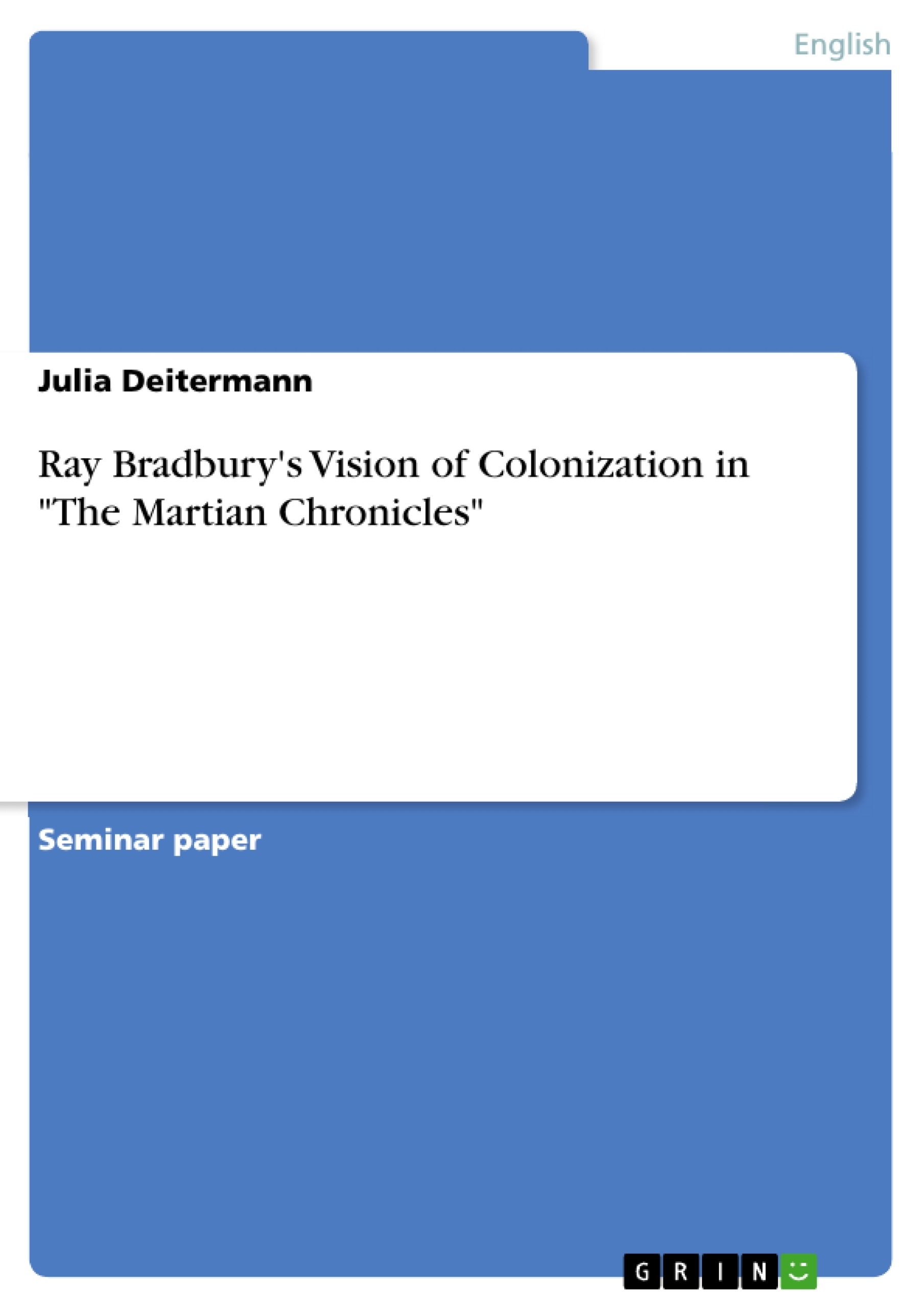Centuries ago, the colonization of the New World represented one of the major aims of European nations and has been praised or criticized ever since. In The Martian Chronicles, Ray Bradbury repeats the past by depicting the conquest and colonization of another planet rather than another continent. Settling on Mars is the only escape left for the population on Earth, which has become a decaying planet facing major environmental, social and political problems. As people have destroyed their former basis for living, they try to find a new one on the foreign planet Mars. History repeats itself during the colonization of Mars, as native populations are decimated and strangeness is familiarized by cultivating the foreign land in order to suit the colonizers’ desires. In his novel, Bradbury questions and criticizes the concept of colonization, thereby drawing on Mars as a symbol of America after its discovery by Columbus, and its inescapable ‘cultivation’ through the Pilgrims. However cruel the history of colonization might be, it is also regarded inevitable for the rest of the world as increasing populations long for more territories and resources. The criticism in the novel primarily centers on how this expansion takes place, namely in a destructive and exploitative way. Bradbury reveals the tensions between inhabitants of Earth and those of Mars, thus questioning the Earthmen’s reckless behavior towards native Martians which serve as a symbol for Native Americans. Moreover, the author criticizes mankind’s irresponsible exploitation of the resources they have been given on Earth, and their ability to destroy nature without even realizing or considering the terrible outcome. The issues to be discussed in the following are those of imperialism, environmental destruction and racism, all being rooted in the mythology of the American westward expansion and the Frontier spirit. By large, Bradbury’s novel also reflects the anxieties of the early 1950s, namely the fear of a nuclear war and the emergence of the Civil Rights movement. A significant basis for the interpretation of The Martian Chroniclesis the approach to the story as an allegory for man’s immoral blindness in the light of the ‘manifest destiny’ and the frontier spirit. [...]
Table of Contents
- Ray Bradbury's Vision of Colonization in The Martian Chronicles
Objectives and Key Themes
This paper analyzes Ray Bradbury's The Martian Chronicles, examining its portrayal of colonization and its allegorical representation of American westward expansion. The analysis focuses on the novel's critique of imperialism, environmental destruction, and racism.
- The destructive nature of colonization
- The allegorical representation of American westward expansion
- The comparison between the treatment of Native Americans and Martians
- Humanity's irresponsible exploitation of resources
- The tension between Earth and Martian civilizations
Chapter Summaries
Ray Bradbury's Vision of Colonization in The Martian Chronicles: This work analyzes Ray Bradbury's *The Martian Chronicles*, exploring its depiction of colonization as a reflection of the American westward expansion. The essay examines Bradbury's critique of imperialism, environmental destruction, and racism within the context of the novel's allegorical structure. It highlights the parallels drawn between the colonization of Mars and the historical colonization of America, focusing on the destructive impact on indigenous populations and environments. The author uses Bradbury's portrayal of the Martian civilization to critique humanity's tendency towards reckless exploitation and its disregard for the consequences of its actions. The analysis delves into the themes of "manifest destiny" and the "frontier spirit," examining how Bradbury uses the Martian setting to explore these concepts and their ethical implications. The essay concludes by emphasizing the timeless relevance of Bradbury's critique of colonization and its continuing resonance with contemporary issues.
Keywords
Colonization, Mars, The Martian Chronicles, Ray Bradbury, American Westward Expansion, Imperialism, Environmental Destruction, Racism, Manifest Destiny, Frontier Spirit, Native Americans, Indigenous Populations, Allegory.
Ray Bradbury's *The Martian Chronicles*: Frequently Asked Questions
What is the main focus of this academic analysis?
This paper analyzes Ray Bradbury's The Martian Chronicles, focusing on its portrayal of colonization and its allegorical representation of American westward expansion. The analysis examines Bradbury's critique of imperialism, environmental destruction, and racism within the novel.
What are the key themes explored in the analysis of *The Martian Chronicles*?
Key themes include the destructive nature of colonization, the allegorical link to American westward expansion, the comparison between the treatment of Native Americans and Martians, humanity's irresponsible exploitation of resources, and the tension between Earth and Martian civilizations.
What does the chapter summary cover?
The chapter summary provides a detailed overview of the analysis of The Martian Chronicles. It explores how Bradbury uses the Martian setting to critique imperialism, environmental destruction, and racism, drawing parallels between the colonization of Mars and the historical colonization of America. The summary highlights the analysis of "manifest destiny" and the "frontier spirit" and emphasizes the lasting relevance of Bradbury's critique.
What are the key concepts and terms discussed in the analysis?
Keywords include: Colonization, Mars, The Martian Chronicles, Ray Bradbury, American Westward Expansion, Imperialism, Environmental Destruction, Racism, Manifest Destiny, Frontier Spirit, Native Americans, Indigenous Populations, and Allegory.
What type of document is this HTML providing?
This HTML provides a structured overview of an academic analysis of Ray Bradbury's The Martian Chronicles. It includes a table of contents, objectives, key themes, chapter summaries, and keywords.
What is the purpose of this HTML document?
The purpose is to offer a concise and readily accessible summary of the academic paper's content, making its key arguments and findings easily discoverable for academic research and study.
- Citar trabajo
- Julia Deitermann (Autor), 2004, Ray Bradbury's Vision of Colonization in "The Martian Chronicles", Múnich, GRIN Verlag, https://www.grin.com/document/61104




